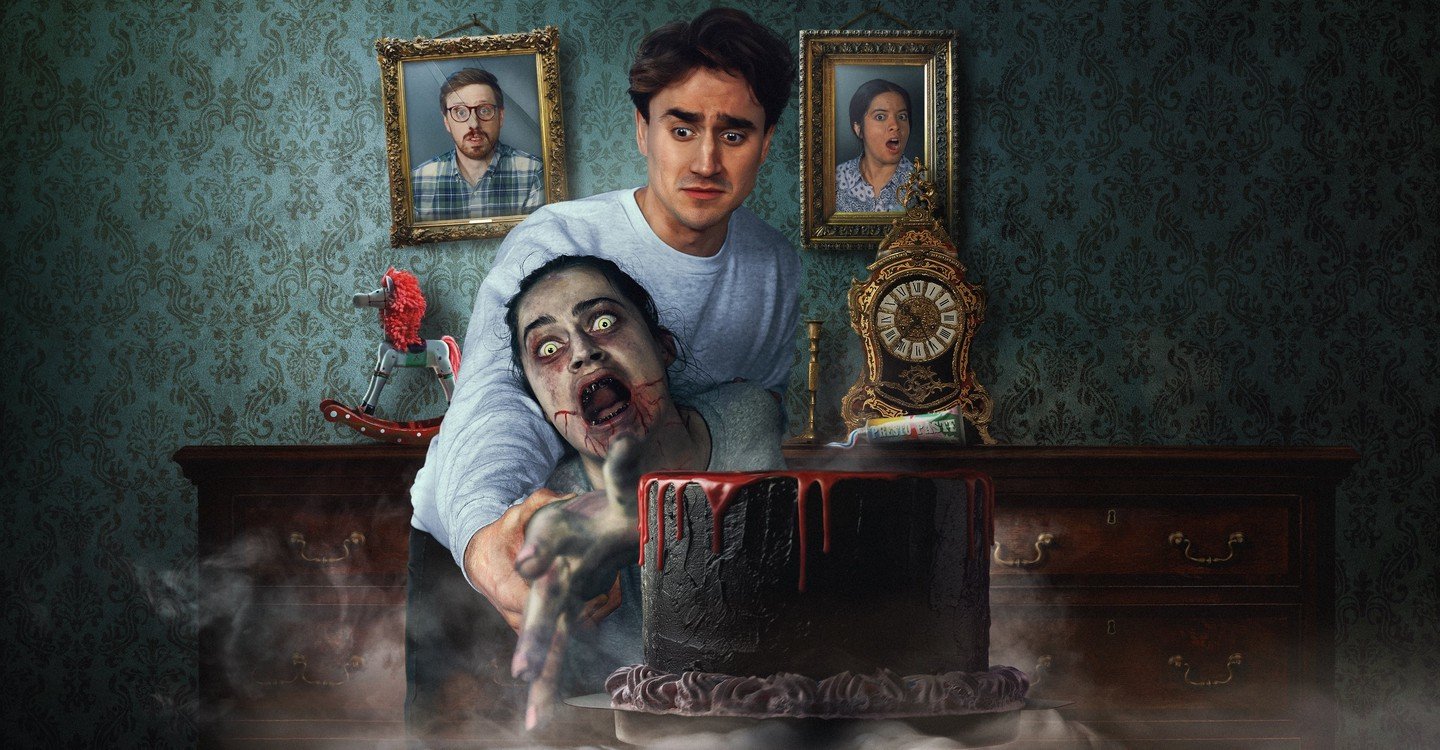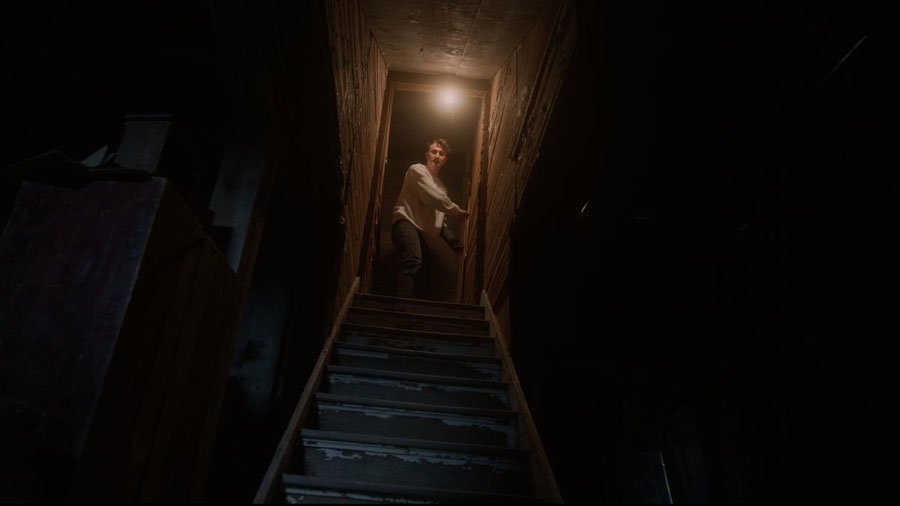[Film Review] Sorry About the Demon (2022)

In the world of horror film criticism and analysis, common discourse entertains the ‘what abouts’ of subgenres. What is it about a PG-13 horror film that splits opinions so strongly? What is it about exploitation horror that often causes outrage and loathing?What about a horror comedy draws an audience in? Exactly what audience is the horror comedy trying to draw? Can horror comedy really work?
These are simple questions that never really elicit a clear answer. Why? Because film is subjective. There is no clear answer. All one has to do is pop onto Twitter to see equal parts hatred and love from different viewers for the same film. Because there is no such thing as a universally loved movie – there are far too many contrarians to ever have full agreement on anything. All this is to say, it is surely a daunting task to tackle a horror comedy. There is a balance required to the mixing of genres that can easily fall flat as a pancake or feel as bloated as a blimp. All that’s to say, Sorry About the Demon from writer/director Emily Hagins manages to hold weight within this subgenre with what feels like a truly unique concept of a man so pathetic that even a demon doesn’t want to be around (or inside) him.

The smart thing Hagins does with Sorry About the Demon is to not lean too heavily on either the horror or comedy genre. There are cliches that abound in the film, and that’s a decision that feels deliberate in the writing. The story is contained largely within a single location, a mansion that was purchased for far too little to expect anything less than demonic possession, or at least a low-level haunting. The family we’re initially introduced to is Cleaver-esque, insistent upon making a deal with the devil over their adorable daughter Grace’s soul. We’re quickly introduced to Will (Jon Michael Simpson), a hapless loser, wandering between jobs, sure that his purpose is just an inspiration away. He’d be happy and fine with his wayward existence if it weren’t for his drag of a girlfriend Amy (Paige Evans) who insists she needs at least an equal partner in order for their relationship to progress. After a quick breakup, Will finds his way to the possessed mansion and a demon that isn’t satisfied with just any ‘ol soul.

The relationship between Will and Amy is the biggest drag in the narrative of the story, as Amy feels like the kind of character often written by a man, in the nagging sense. She plays a bigger role later in the narrative, but the relationship between Will and Amy isn’t quite strong enough to believe she’d ever revisit their love, let alone step far enough into his unnaturally affordable new residence to drive the plot.
LISTEN TO OUR HORROR PODCAST!
Simpson is undeniably adorable as Will who, once he understands the situation he’s put himself in, becomes just insolent enough to finally face his own insecurities which are, somehow, far scarier than the demon that is so desperately trying to exorcize Will from his house. His delivery is the key to unlocking the comedic appeal, him, and standout ‘friend of a friend’ Aimee (Olivia Ducayen), a character that feels like a true original and that I wish I could have spent way more time with.
As far as the horror aspects of the story, there were boxes checked when dealing with a haunting or possession, but nothing scary or suspenseful. I would happily place Sorry About the Demon in the “gateway horror” category that other films given a bigger budget have fallen short in, as there’s nothing really subversive or risky in the story, but there are a lot of fun, games, and oozy black demon goo. All in all, Sorry About the Demon is pretty damn fun. And sometimes pretty damn fun is just fine! And it’s a far greater thing to support smaller indie productions that are made with love and passion than big budget fare with equally disappointing girlfriend characters.























![[Ghouls Podcast] Ghouls Watch: Bucket List of the Dead, Blood Drive, Candy Land & more](https://images.squarespace-cdn.com/content/v1/5fe76a518d20536a3fbd7246/1696261000263-58VQFOVWPE363OFGP7RF/GHOULS+WATCH.jpg)
![[Ghouls Podcast] Tender Is The Flesh with Zoë Rose Smith, Bel Morrigan and Liz Bishop](https://images.squarespace-cdn.com/content/v1/5fe76a518d20536a3fbd7246/1693769261264-MS4TS4Z4QC1N15IXB4FU/Copy+of+%5BJuly%5D+Antiviral%2C+possesoor+and+infinity+pool.jpg)
![[Ghouls Podcast] Antiviral, Possessor & Infinity Pool with Zoë Rose Smith, Amber T and Iona Smith](https://images.squarespace-cdn.com/content/v1/5fe76a518d20536a3fbd7246/1691238787263-XYRKXW2Z7RWI9AY2V2GX/%5BJuly%5D+Antiviral%2C+possesoor+and+infinity+pool+%281%29.jpg)
![[Ghouls Podcast] Ghouls Watch: Body Horror Recommendations](https://images.squarespace-cdn.com/content/v1/5fe76a518d20536a3fbd7246/1691238687847-L9U434I1U4HZ3QMUI3ZP/%5BJuly%5D+Ghouls+Watch+-+Website+%281%29.jpg)
![[Ghouls Podcast] Ghouls Watch: Bones and All, Suitable Flesh, The Human Centipede & more](https://images.squarespace-cdn.com/content/v1/5fe76a518d20536a3fbd7246/1687855203348-7R2KUSNR6TORG2DKR0JF/%5BJune%5D+Ghouls+Watch+-+Website.jpg)
![[Ghouls Podcast] 3 Original vs. Remake Horror Films with Rebecca McCallum & Kim Morrison](https://images.squarespace-cdn.com/content/v1/5fe76a518d20536a3fbd7246/1685286663069-0Q5RTYJRNWJ3XKS8HXLR/%5BJune%5D+Original+vs.+Remake+Horror+Films.png)
![[Ghouls Podcast] Ghouls Watch: The Devil’s Candy, Morgana, Dead Ringers & more](https://images.squarespace-cdn.com/content/v1/5fe76a518d20536a3fbd7246/1685284429090-5XOOBIOI8S4K6LP5U4EM/%5BMay%5D+Ghouls+Watch+-+Website.png)
![[Ghouls Podcast] The Ruins (2008) with Ash Millman & Zoë Rose Smith](https://images.squarespace-cdn.com/content/v1/5fe76a518d20536a3fbd7246/1684076097566-BE25ZBBECZ7Q2P7R4JT4/The+Ruins.jpg)
![[Ghouls Podcast] Ghouls Watch: Deathproof, Child’s Play, Ghostwatch & more](https://images.squarespace-cdn.com/content/v1/5fe76a518d20536a3fbd7246/1682447065521-DWF4ZNYTSU4NUVL85ZR0/ghouls+watch.png)
![[Ghouls Podcast] 5 Coming-of-Age Horror Film Recommendations](https://images.squarespace-cdn.com/content/v1/5fe76a518d20536a3fbd7246/1681418402835-EMZ93U7CR3BE2AQ1DVH4/S2+EP5.png)
![[Ghouls Podcast] Good For Her Horror Film Recommendations](https://images.squarespace-cdn.com/content/v1/5fe76a518d20536a3fbd7246/1678634497037-W441LL37NW0092IYI57D/Copy+of+Copy+of+GHOULS+PODCAST+THE+LOVED+ONES.jpg)
![[Ghouls Podcast] Ghouls Watch: Severance, Run Sweetheart Run, Splice & more](https://images.squarespace-cdn.com/content/v1/5fe76a518d20536a3fbd7246/1677589685406-YZ9GERUDIE9VZ96FOF10/Copy+of+GHOULS+PODCAST+THE+LOVED+ONES+%281%29.jpg)
![[Ghouls Podcast] The Loved Ones (2009) with Liz Bishop](https://images.squarespace-cdn.com/content/v1/5fe76a518d20536a3fbd7246/1676369735666-56HEK7SVX9L2OTMT3H3E/GHOULS+PODCAST+THE+LOVED+ONES.jpg)
![[Ghouls Podcast] Terrifier (2016) & Terrifier 2 (2022) with Janine Pipe](https://images.squarespace-cdn.com/content/v1/5fe76a518d20536a3fbd7246/1674478017541-0DHH2T9H3MVCAMRBW1O1/_PODCAST+NO+IMAGE+2023+EP+4+%282%29.jpg)
![[Ghouls Podcast] Krampus (2015) with Megan Kenny & Rebecca McCallum](https://images.squarespace-cdn.com/content/v1/5fe76a518d20536a3fbd7246/1672839790368-VYX6LIWC5NVVO8B4CINW/_PODCAST+NO+IMAGE+2023+EP+17.jpg)
![[Ghouls Podcast] Soho Horror Film Review with Hannah Ogilvie & Caitlyn Downs](https://images.squarespace-cdn.com/content/v1/5fe76a518d20536a3fbd7246/1672840392291-XQGQ94ZN9PTC4PK9DTN1/_PODCAST+NO+IMAGE+2023+EP+16.jpg)
![[Ghouls Podcast] The Borderlands (2013) with Jen Handorf](https://images.squarespace-cdn.com/content/v1/5fe76a518d20536a3fbd7246/1672839985316-KPLOVA9NGQDAS8Z6EIM9/_PODCAST+NO+IMAGE+2023+EP+15.jpg)
![[Ghouls Podcast] Soho Horror Film Preview with Hannah Ogilvie & Caitlyn Downs](https://images.squarespace-cdn.com/content/v1/5fe76a518d20536a3fbd7246/1672840411619-IP54V5099H6QU9FG4HJP/_PODCAST+NO+IMAGE+2023+EP+14.jpg)
![[Ghouls Podcast] Halloween Special: 5 Horror Films to Watch This Halloween with Joshua Tonks and Liz Bishop](https://images.squarespace-cdn.com/content/v1/5fe76a518d20536a3fbd7246/1672840351086-2AWFIS211HR6GUY0IB7I/_PODCAST+NO+IMAGE+2023+EP+13.jpg)
![[Ghouls Podcast] Horror Literature with Nina Book Slayer & Alex Bookubus](https://images.squarespace-cdn.com/content/v1/5fe76a518d20536a3fbd7246/1672840273346-ASHBRDHOKRHMGRM9B5TF/_PODCAST+NO+IMAGE+2023+EP+12.jpg)
![[Ghouls Podcast] Alien with Tim Coleman and Rebecca McCallum](https://images.squarespace-cdn.com/content/v1/5fe76a518d20536a3fbd7246/1672839878802-LR40C39YGO3Q69UCCM62/_PODCAST+NO+IMAGE+2023+EP+11.jpg)
![[Ghouls Podcast] Final Destination with Jenn Adams and Rebecca McCallum](https://images.squarespace-cdn.com/content/v1/5fe76a518d20536a3fbd7246/1672839916928-KK9CTT0OAKACXLGYA9DX/_PODCAST+NO+IMAGE+2023+EP+10.jpg)
![[Ghouls Podcast] Dark Water with Melissa Cox and Rebecca McCallum](https://images.squarespace-cdn.com/content/v1/5fe76a518d20536a3fbd7246/1672839939630-BLPIHIDVRJE9FC1A9BRZ/_PODCAST+NO+IMAGE+2023+EP+9.jpg)
![[Ghouls Podcast] Noroi: The Curse & Perfect Blue with Sarah Miles and Ygraine Hackett-Cantabrana](https://images.squarespace-cdn.com/content/v1/5fe76a518d20536a3fbd7246/1682950816911-7ZCMPP8H0BSUPCPZYQ07/_PODCAST%2BNO%2BIMAGE%2B2023%2BEP%2B8.jpg)
![[Ghouls Podcast] The Wicker Man with Lakkaya Palmer](https://images.squarespace-cdn.com/content/v1/5fe76a518d20536a3fbd7246/1672839898764-VIYDC7ZD8QTBCGK562NL/_PODCAST+NO+IMAGE+2023+EP+7.jpg)
![[Ghouls Podcast] You Are Not My Mother with Ygraine Hackett-Cantabrana](https://images.squarespace-cdn.com/content/v1/5fe76a518d20536a3fbd7246/1672840165939-VP0CIKOM4KPX67JLNHDB/_PODCAST+NO+IMAGE+2023+EP+6.jpg)
![[Film Review] Sympathy for the Devil (2023)](https://images.squarespace-cdn.com/content/v1/5fe76a518d20536a3fbd7246/1697186986143-QDVLQZH6517LLST682T8/Screenshot+2023-10-13+at+09.48.52.png)
![[Film Review] V/H/S/85 (2023)](https://images.squarespace-cdn.com/content/v1/5fe76a518d20536a3fbd7246/1697455043249-K64FG0QFAFVOMFHFSECM/MV5BMDVkYmNlNDMtNGQwMS00OThjLTlhZjctZWQ5MzFkZWQxNjY3XkEyXkFqcGdeQXVyMTUzMTg2ODkz._V1_.jpg)
![[Film Review] Kill Your Lover (2023)](https://images.squarespace-cdn.com/content/v1/5fe76a518d20536a3fbd7246/1697465940337-T55VQJWAN4CHHJMXLK32/56_PAIGE_GILMOUR_DAKOTA_HALLWAY_CONFRONTATION.png)
![[Film Review] Shaky Shivers (2022)](https://images.squarespace-cdn.com/content/v1/5fe76a518d20536a3fbd7246/1696442594997-XMJSOKZ9G63TBO8QW47O/Screenshot+2023-10-04+at+18.59.33.png)
![[Film Review] Elevator Game (2023)](https://images.squarespace-cdn.com/content/v1/5fe76a518d20536a3fbd7246/1696440997551-MEV0YZSC7A7GW4UXM5FT/Screenshot+2023-10-04+at+18.31.42.png)
![[Film Review] A Wounded Fawn (2022)](https://images.squarespace-cdn.com/content/v1/5fe76a518d20536a3fbd7246/1695484054446-7R9YKPA0L5ZBHJH4M8BL/Screenshot+2023-09-23+at+16.42.24.png)
